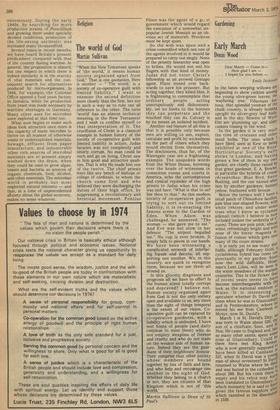Religion
The world of God
Martin Sullivan
"When the New Testament speaks of 'the world,' it means human society organised apart from God." That is one quotation. Here is another — "'The world,' is a society of co-operative guilt with limited liability." I want to examine the second definition more closely than the first, but not in such a way as to rule out all reference to the other. The term 'world' has an almost technical meaning in the New Testament and I wish to confine myself to that interpretation of it. The crucifixion of Christ is a classical example in human history of the society of co-operative guilt with limited liability in action. Judas Iscariot was not completely and utterly corrupt. No man could be such and go on living. Christ saw in him good and attractive qualities. That is why He made him one of the twelve. The chief priests were like any bench of bishops or college of cardinals, to whom the church came first and who believed they were discharging the duties of their high office, by suppressing a revolutionary and heretical movement. Pontius Pilate was the agent of a gicit government which would regard the execution of a somewhat unpopular Jewish Messiah as an obvious act of statecraft. Provinces must be kept quiet.
So the web was spun and a crime committed which not one of the agents involved in it would be prepared to carry out singly. None of the priestly hierarchy was open to bribes. He would not soil his fingers with that kind of money. Judas did not enter Christ's fellowship as an avowed Gestapo agent. Pilate leaned over backwards to save his prisoner. But acting together, they killed Him. It is frightening to contemplate that ordinary people acting unscrupulously and dishonourably, set no limits to the horrors they can perpetrate and the mischief they can do. Calvary is by no means an isolated incident.
Another sad feature of all this is that it is possible only because men are willing to use, exploit, calculate and profit by wickedness on the part of others which they would shrink from themselves. The disclosures, thus far, of the Watergate case are a frightening example. The unspoken words from the White House, hovering over the heads of witnesses in committee rooms and courts in America, echo the contemptuous and cynical rejoinder of the high priests to Judas when his crime was laid bare: "What is that to us? See thou to that." As this modern society of co-operative guilt is trying to sort out its limited liability, it is re-enacting the famous scene in the Garden of Eden. When Adam was challenged, he answered, "The woman — she gave me to eat." And Eve was not slow in her defence: "The serpent beguiled me." No cup is ever broken. It simply falls to pieces in our hands. We have been witnessing a complicated network of interlacing frauds and deceits, all supporting one another. We, in this country, are quick to recognise them, because we see them all around us.
Is this gloomy diagnosis and prognosis all we have to offer? Is the human scene totally corrupt and depraved? I believe not. Human society organised apart from God is not the only society open and available to us, any more than the sight of things temporal is the extent of our vision. Cooperative guilt can be replaced by co-operative goodness, with a liability which is unlimited. I have met hosts of people (and daily continue to meet them) who do not employ weapons of finesse and cruelty and who do not trade on the weaker side of human nature. Indeed they are the guardians of their neighbours' honour. They comprise that other society whose members are bound together by ties of faith and love, and who help and encotirage one another in the sight of God. Whether they belong to a church or not, they are citizens of that Kingdom which is not of 'this world.'
































 Previous page
Previous page